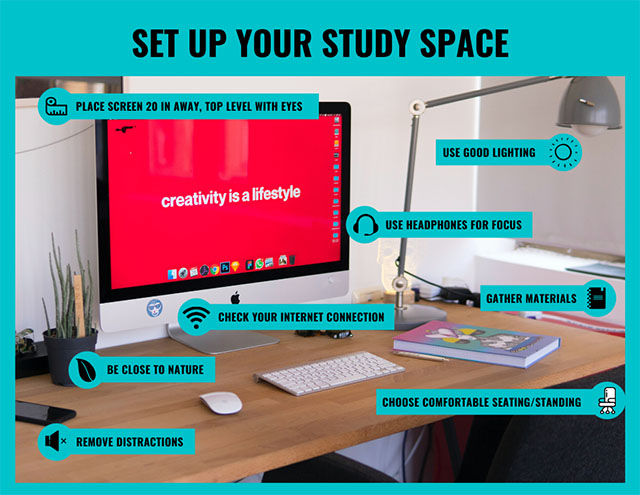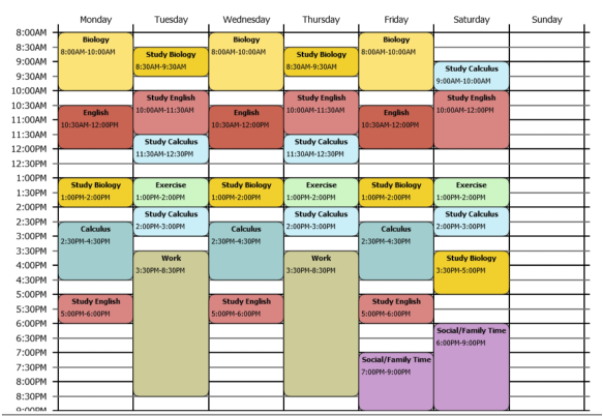Effective Study Strategies
Here are some essential learning strategies that support success in the physical and online classroom.

Photo by JESHOOTS.COM on Unsplash
Direct link: https://www.vcc.ca/keep-learning/effective-study-strategies/#q-10687721
Create a productive learning space at home:
- Choose somewhere as quiet and distraction-free as possible.
- Gather your tools and materials.
- Think about ergonomics – your seating, computer placement and lighting.
- Add a plant, motivational quotes, or meaningful object to inspire you.
- Discuss how responsibilities or technology will be shared in your household, if needed.

Direct link: https://www.vcc.ca/keep-learning/effective-study-strategies/#q-6301266
Time management is often a challenge in adjusting to post-secondary and online learning. Students find they need to be responsible for planning regular study sessions and be realistic about how much time is needed outside of scheduled lectures to achieve their learning goals. To stay motivated and on track:
- Identify your goals for the term.
- Create a term schedule with all your assignments and exam dates.
- Create a weekly schedule with class time, study time, and other commitments. Plan to set aside 10-15 hours per week for a 3-credit university level course.
- Set a daily routine to help with motivation.
- Use a daily to do list and prioritize tasks. Use an app (for example, Google Calendar, Reminders, or ToDoist) or make a paper to do list.
- Plan time for self-care: exercise, socializing, mindfulness/meditation and relaxing.
 Semester/Term Schedule Template
Semester/Term Schedule Template
Use this Word template to create your semester schedule by day of the week or by course
Direct link: https://www.vcc.ca/keep-learning/effective-study-strategies/#q-6301267
Connecting with your learning community supports motivation, feelings of belonging and enhances your learning. Whether online or in-person, there are lots of opportunities to engage:
- Find out how to connect with your instructor. When are their office hours? How can you reach them? See our tips for writing effective emails.
- Connect with classmates both in the classroom (face-to-face conversations, Moodle discussion forums, messaging) and outside (library study group meetup, WhatsApp group, Zoom study group, etc).
- Participate in class. Ask questions. If you are learning online, see our Best Practices for Zoom Classes.
- Connect to Students Union of Vancouver Community College (SUVCC) app.
- Reach out to free student supports like academic tutoring, counselling, librarians, Indigenous advisors and Elder support, disability services and more. Get Support
How to Write an Email to Your Instructor
Direct link: https://www.vcc.ca/keep-learning/effective-study-strategies/#q-6301269
To improve your study productivity:
- Pick a space that supports your ability to focus.
- Remove distractions (cell phones, open internet browsers, etc). See below for our favorite focus apps.
- Set a clear to-do list for your study session.
- Use the Pomodoro timer technique to study in 25 min chunks with a short break. Stretch, move and focus your eyes away from screens during your break.
- Use "Study with me" videos.
- Play white noise or ambient instrumental music.
- Set up a study group or have an accountability partner.
- If studying at home, try to get roommates on board. Ask them to help but not interrupting you at certain times so you can study. Try a "do not disturb" sign.
This video will introduce you to the Pomodoro timer technique for improved productivity (1 minute).
-
Cold TurkeyBloBlock websites or the entire internet for set amounts of time and get motivational quotes to ensure focused work. [PC and MAC]
-
Leave your phone alone and let the tree grow while you focus on your work with this app. Donate your focus time toward planting real trees.
Direct link: https://www.vcc.ca/keep-learning/effective-study-strategies/#q-6301270
Being an active learner improves understanding and retention. To stay engaged in readings and lectures and be better able to recall what you’ve learned:
- Pre-read or preview the lecture/reading. Get your brain ready!
- Identify your learning objectives: what do you need to know or do?
- For live lectures: arrive a few minutes early (whether in the classroom or on Zoom). If online, keep your camera on if possible. Take notes to improve understanding, participate, and ask questions.
- For pre-recorded lectures: pause every 5-10 minutes and summarize aloud. Take notes, attempt example problems and record questions.
- For digital texts: beware of your brain’s tendency to quickly scan without thinking about what you’re reading! Read small sections, then pause to summarize aloud or take notes. Try some of our recommended reading apps below.
- At the end of the lecture/reading, see if you can answer all your learning objectives.
- Follow up on questions with your instructor, classmates or Learning Centre tutor
Recommended Apps
- JustRead
Chrome App that simplifies websites for reading: removing ads, pop-ups, and easy-to-read text view. For Safari, download the Safari Reader Mode extension. - NaturalReader
Free text to speech online converter. - Spritz
Free speed-reader app.
Direct link: https://www.vcc.ca/keep-learning/effective-study-strategies/#q-6304168
The Learning Centre provides free, confidential academic support for VCC students to help them develop their academic skills and learning strategies.
- Make an academic coaching appointment with the Learning Centre coordinator to discuss study challenges and identify effective approaches to learning.
- Make an appointment with a Learning Centre tutor (English/English language, Business, Math/Science, and Life Sciences) to work on course concepts or general academic skills explain your understanding of material.
- Use WriteAway, a free writing tutoring service across British Columbia that provides writing feedback by email for students doing university level writing to help you improve your skills.
- Attend workshops on learning strategies, tech skills, and find hundreds of learning resources on our website.

